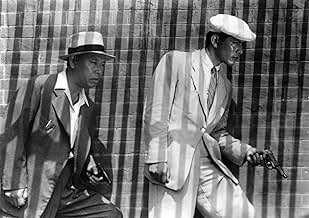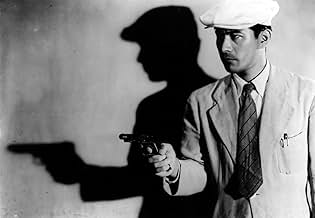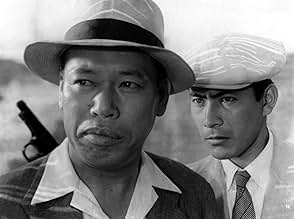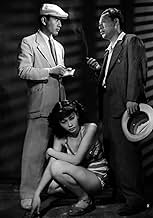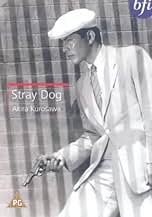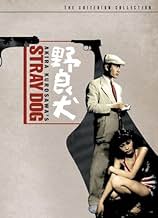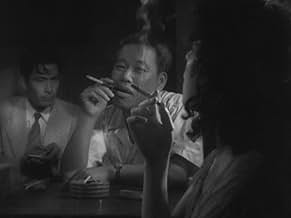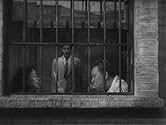NOTE IMDb
7,8/10
19 k
MA NOTE
Au cours d'un été étouffant, un détective d'homicide inexpérimenté tente de retrouver son pistolet Colt volé.Au cours d'un été étouffant, un détective d'homicide inexpérimenté tente de retrouver son pistolet Colt volé.Au cours d'un été étouffant, un détective d'homicide inexpérimenté tente de retrouver son pistolet Colt volé.
- Récompenses
- 4 victoires au total
Histoire
Le saviez-vous
- AnecdotesMuch of the film was filmed from the slum streets of post war Japan. These were filmed under chief assistant director Ishirô Honda, who had gone with camera operator Kazuo Yamada into some dangerous, even yakuza run, territory. Many of the scenes of Toshirô Mifune's character from the waist down are actually Honda standing in. In his book, Something Like an Autobiography, Akira Kurosawa described Honda's role stating, "I had Honda do mainly second-unit shooting. Everyday I told what I wanted and he would go out into the ruins of postwar Tokyo to film. There are few men as honest and reliable as Honda. He faithfully brought back exactly the footage I requested, so almost everything he shot was used in the final cut of the film. I'm often told that I captured the atmosphere of postwar Japan very well in Stray Dog, and if so I owe a great deal of that success to Honda."
- GaffesAt one point, there is a man playing a tune on a harmonica that needs two people with harmonicas to play.
- Citations
Police Inspector Nakajima: Bad luck either makes a man or destroys him. Are you gonna let it destroy you? Depending how you take it, bad luck can be a big break.
- ConnexionsFeatured in The Story of Film: An Odyssey: Sex & Melodrama (2011)
- Bandes originalesThe Waves of the Danube
(uncredited)
Composed by Iosif Ivanovici
[Played on a harmonica outside the bar when Murakami follows Ogin]
Commentaire à la une
Impressive as some of the later films of Kurosawa are - "Kagemusha" and "Ran" for example, I have to confess that it is his early work, particularly those set in modern Japan as opposed to its feudal past, that I find myself returning to with greater pleasure. He was not one of those artists who necessarily got better and better, rather was he one who continued to take on different challenges, not always with the same degree of success, as "Dodesukaden" and "Dreams" were to prove. I have long regarded the 1952 "Ikiru" as his greatest achievement, with the three modern day day films starring Toshiro Mifune that precede it, "Drunken Angel", "The Quiet Duel" and "Stray Dog", fascinating consolidations of his skill as a director. "Stray Dog" revels in technical accomplishment. It tells the story of a policeman who, after experiencing the theft of his gun while travelling on a bus, embarks on an odyssey to retrieve it. Questions of morality and honour loom large as they do in any Kurosawa film, with the quest becoming ever more urgent as evidence is gathered of the weapon being used in criminal activities. What might be regarded as plain bad luck in another culture is here seen as a matter of shame and dishonour by the unfortunate policeman, that has to be addressed forsaking all else. The search is pursued in a dazzling series of chases, encounters and interrogations that leaves the audience, like the hero, exhausted at times. The weather is hot throughout, characters sweat profusely and sometimes everything erupts in a tropical downpour - no other director uses rain so physically. Perhaps, at over two hours, "Stray Dog" is a little too long to sustain its material. It sags a little in the middle, but the chases at the outer ends of the film are wonderfully done, particularly the penultimate sequence where the cop pursues his prey through vegetation where city and countryside meet. You can almost smell the steamy atmosphere of a morning after rain where everything is about to heat up again. Possibly the other two Mifune films of the same period have the edge on this. They are more meditative works, their lengths more sustainable. But, for sheer cinematic bravado, this is the one.
- jandesimpson
- 2 août 2002
- Permalien
Meilleurs choix
Connectez-vous pour évaluer et suivre la liste de favoris afin de recevoir des recommandations personnalisées
- How long is Stray Dog?Alimenté par Alexa
Détails
Box-office
- Montant brut aux États-Unis et au Canada
- 46 808 $US
- Week-end de sortie aux États-Unis et au Canada
- 15 942 $US
- 28 juil. 2002
- Montant brut mondial
- 46 961 $US
- Durée2 heures 2 minutes
- Couleur
- Mixage
- Rapport de forme
- 1.37 : 1
Contribuer à cette page
Suggérer une modification ou ajouter du contenu manquant

Lacune principale
By what name was Chien enragé (1949) officially released in Canada in French?
Répondre

